- Home
- entertainment
- news
- 14 details you may have missed in 'Russian Doll' season 2
14 details you may have missed in 'Russian Doll' season 2
Ayomikun Adekaiyero

- Warning: Spoilers ahead for season two of "Russian Doll," which premiered last week on Netflix.
- Nadia and Alan return in the second season and go back into the past.
Nadia makes jokes in the hospital that foreshadow key events in season two.
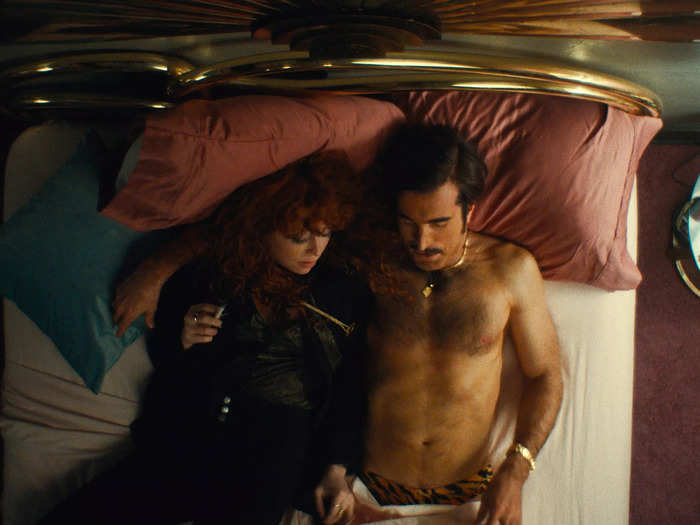
During her trip to the hospital to help her godmother Ruth (Elizabeth Ashley) in season two's first episode, Nadia makes multiple references and jokes which seem to foreshadow events through the rest of the season.
Nadia (Natasha Lyonne) mentions the mythical Greek character Oedipus to a doctor flirting with her when she enters the hospital. In the story, Oedipus kills his father and takes his own mother as his wife. While Nadia doesn't kill her mother (played by Chloë Sevigny), she does accidentally make out with her mother's lover Chez (Sharlto Copley) in season two, episode one.
She also randomly exclaims "polio" while looking at a hospital sign. In episode two, Chez mentions that his father got polio and that stopped his father from working and living his full life.
Finally, Nadia tells Ruth in episode one: "You don't get to choose your genetics. Otherwise, I would have been Nadia Comăneci," referencing the five-time Olympic gold medalist Gymnast.
This idea of choosing her upbringing is what Nadia struggles with throughout season two and is brought up against in the season finale when Lenora asks Nadia if she would choose her again if she could. At this point, Nadia finally accepts the generational trauma passed down from her mother and grandmother.
It's implied that Nadia went back in time to the latter half of 1982 despite her birthday being in March.
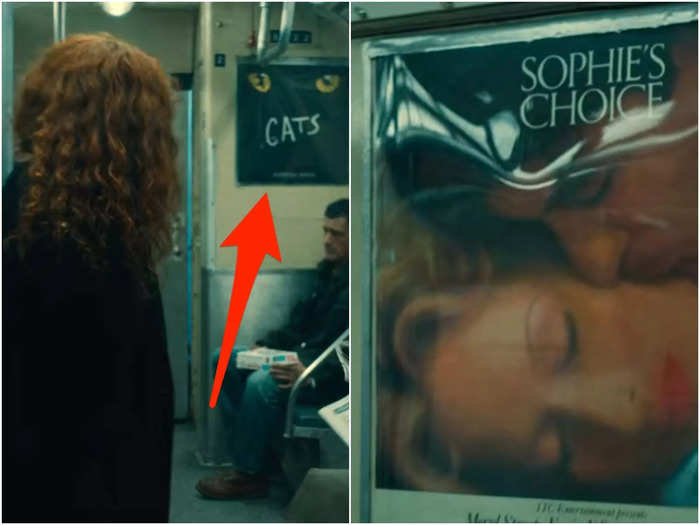
When Nadia first travels back in time to 1982 on New York's subway, she sees posters for the Broadway production of "Cats" and the movie "Sophie's Choice." The latter premiered on December 8, 1982, while the former first opened on Broadway on October 7, 1982.
This would imply that Nadia had gone back in time to the latter half of 1982. However, in episode six, Nadia reveals her birthday is on March 30, which would mean her mother Nora couldn't have been pregnant during this time.
The most likely explanation is that the posters were random choices by production to call back to 1982, unaware of the error.
When Nadia first goes into the past in season two, she reads an article called "The Two Faces of John LeBoutillier."
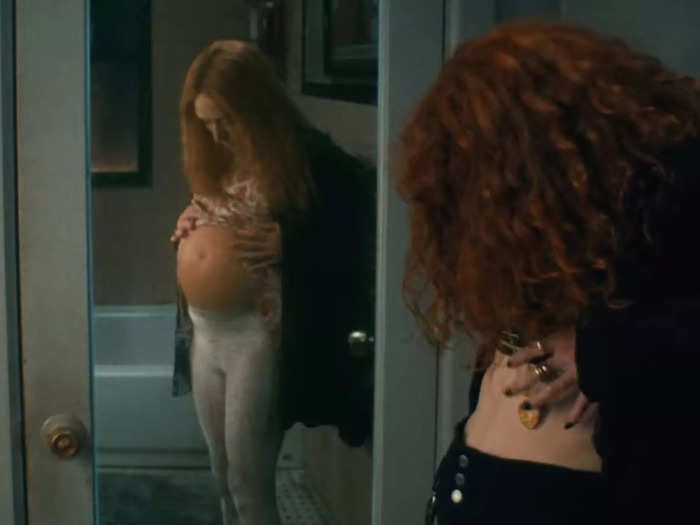
The first sign Nadia has traveled into the past is when she reads a newspaper article titled "The Two Faces of John LeBoutillier." Looking at the article's date, viewers can spot the year is 1982.
At this point, Nadia was unaware that she is traveling back in time or that when she does travel back, her conscious mind is somehow trapped in the bodies of either her mother or her grandmother.
The newspaper headline she sees could also be a clue to viewers that Nadia has two faces in the past, her own and that of the body she's inhabiting.
There are other clues that people aren't really seeing Nadia, but her pregnant mother. A man offers a seat to her on the train in the same scene she reads the article title and later at a bar, someone questions Nadia's decision to buy a beer.
When Nadia first looks in the mirror and sees her mother's reflection in season two, it calls back to the mirror scenes from season one.
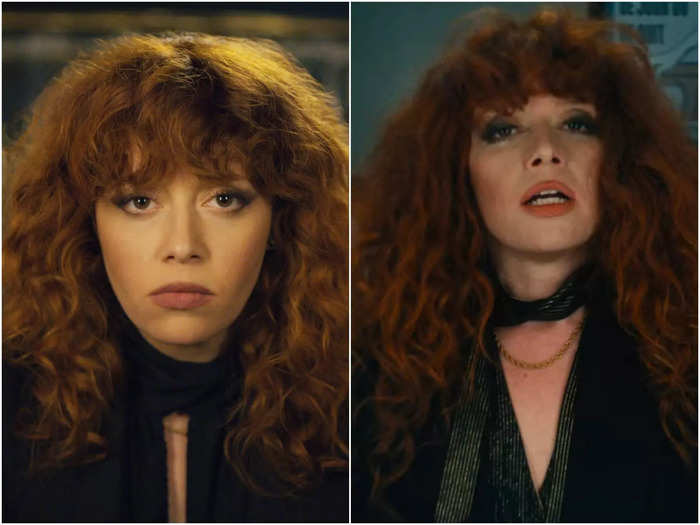
A key moment in season one was Nadia looking at her reflection every time she dies and restarting the time loop. When Nadia first looks at the mirror in season two and sees her mother looking back at her, the scene is eerily similar to those in season one. She's even wearing a similar black outfit.
Reflections are a big part of season two. By the finale, Nadia is finally able to smile at her reflection, showing audiences she has finally accepted all parts of herself.
Alan still has a very clean bedroom in episode one. It shows how he's still not living life to the fullest.
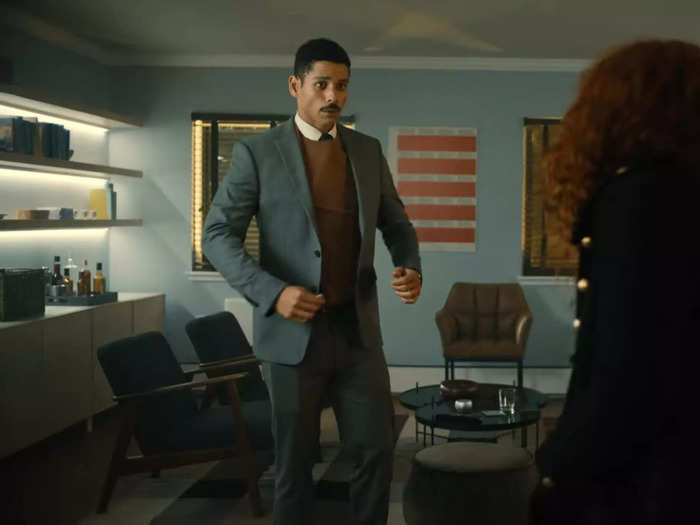
In episode one, Nadia clearly highlights during a conversation with her friend Alan (Charlie Barnett) that both of them are unhappy with their lives despite escaping death and the numerous time loops from season one.
In season one, Alan loved keeping to a routine and that seems to still be the case at the beginning of season two. He still has his very clean apartment, although the TV and couch have been replaced with more seats to make it more of a communal area. Alan also keeps to the routine of feeding his fish before he leaves the house.
However, in the shot, you are unable to see the fish in the bowl. It's later revealed in episode six that Alan's fish died, potentially representing how his old way of life would have led to another early death.
As Alan travels to the past, the doors behind him have German signage, a clue to where he's headed.
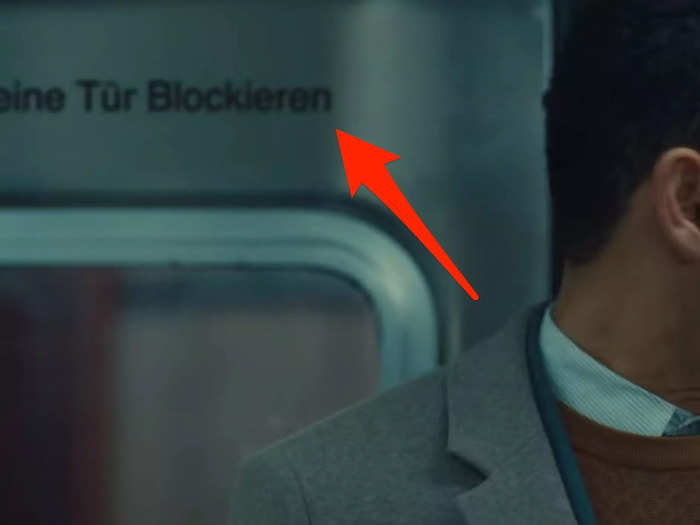
After being persuaded by Nadia, Alan decides to travel to the past through the subway in season two's first episode. However, we don't see where he goes until episode four when he explains to Nadia that he not only traveled back in time to 1962, but also traveled physically to Berlin, Germany.
However, there's a small hint when he enters the subway where he's actually headed. "Keine Tür Blockleren" is written on the doors behind him, which translated from German means "Don't block the door."
While traveling into the past, Nadia meets Farran's father and Alan's grandmother.
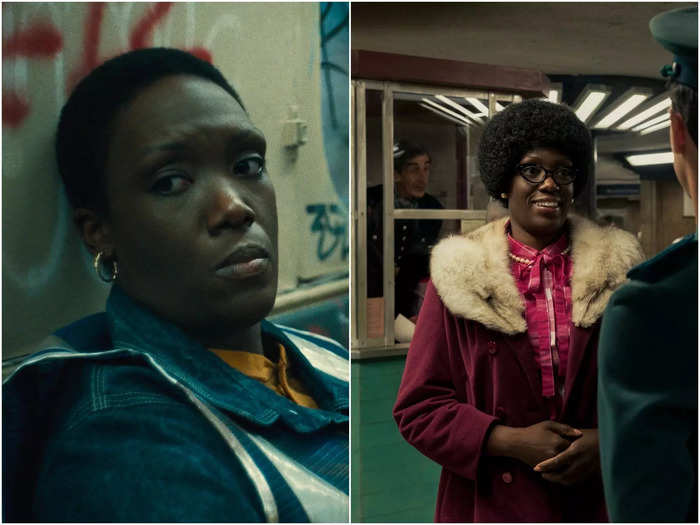
During her trips to 1982, Nadia meets relatives of her friends Alan and Farran (Ritesh Rajan), the latter of whom owns a convenience store near her apartment.
At the beginning of episode three, a woman helps Nadia get off the train before the police are able to arrest her in 1982. In episode six, the same woman appears in the background when Nadia as her mother gives birth that same year. In the final episode, this woman is revealed to be an older version of Alan's grandmother Agnes (Carolyn Michelle Smith), which shows that Nadia and Alan had a connection even before they met in season one.
Nadia also goes to Farran's convenience store while in the past in both episodes one and three. In episode six — after Nadia brings a baby version of herself to the present causing the flow of time to fracture — it's revealed that the man who originally owned the convenience store is Farran's father (Anoop Desai).
Nadia's time-jumping may have had an effect on Ruth in episode four.
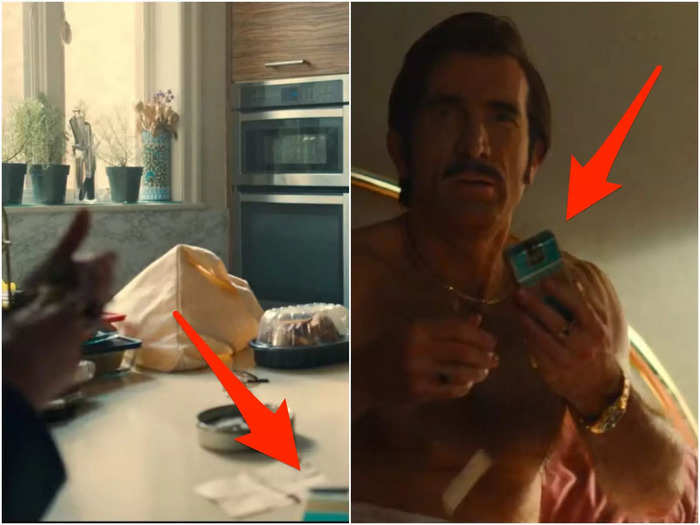
It's unclear whether the time travel in season two actually changes anything in the present or if they are just reliving their ancestors' lives.
However, one moment hinting it could be affecting future events occurs in episode four when Nadia catches Ruth smoking menthol cigarettes, which she claims is abnormal for her godmother. Ruth says it's a reminder of her mother who loved smoking the same type of cigarettes.
This occurs two episodes after Nadia tries to tell 1982 Ruth (Annie Murphy) to stop smoking to prevent her godmother's later lung problems. While Ruth clearly doesn't stop, the change in cigarettes could be a hint that she remembers that conversation.
Maxine talks about "place lag" in episode four, which references Nadia's loss of reality.
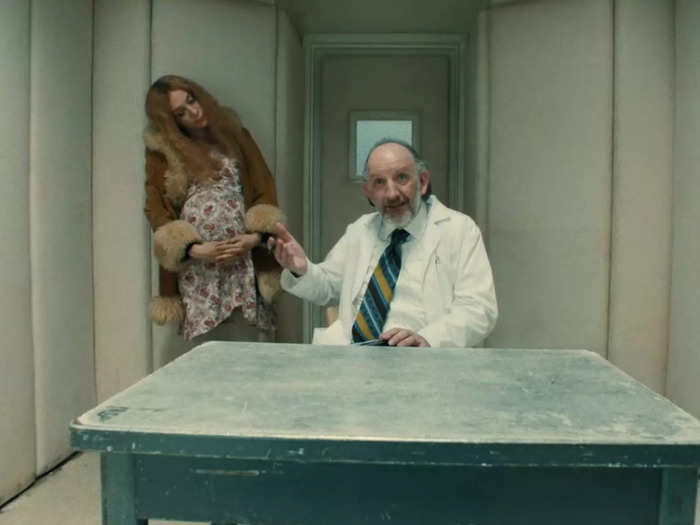
While in Budapest, Maxine (Greta Lee) rants to Nadia about "place lag." Similar to jet lag, place lag — a term coined by airline pilot Mark Vanhoenacker — is where your brain hasn't caught up to the reality that you are in another country and so you carry out actions you would normally do in the previous country. A good example of this is driving on the wrong side of the road.
This idea of your brain not understanding its current reality relates a lot to season two of "Russian Doll." For example, Nadia not being aware that her mother's mental illness is affecting her reality in episode three or in episode six, when Nadia breaks the flow of time.
Nadia's drug tripping scene in episode four has multiple callbacks and foreshadowing.
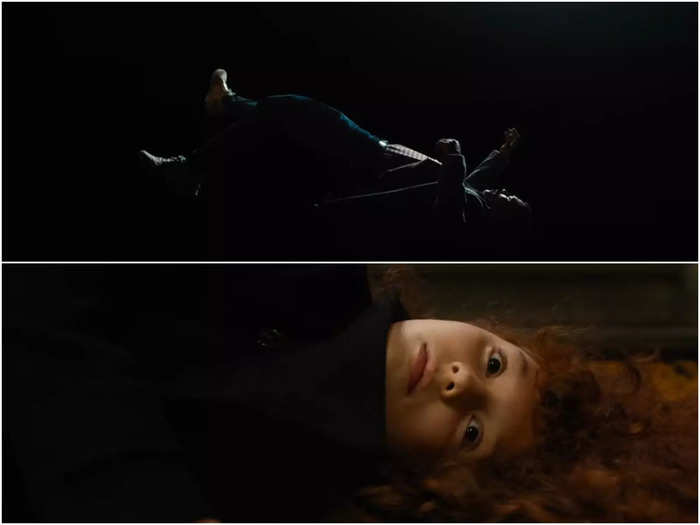
Nadia's journey to find her family's Krugerrands, her family's missing gold coins, takes her to a party in a bunker in Budapest and to Kristofz (Balázs Czukor), the grandson of a Nazi captain who originally stole her family's gold. Kristofz doesn't offer much help but he gives Nadia DMT, a hallucinogenic tryptamine drug, to give her insight.
During his spiel to persuade her to take it, Kristofz says it's "coexistence and lack of existence all at once" which calls back to Nadia's coexisting in the body of her mother and grandmother in the past and also foreshadows the tripping montage where Nadia transforms into the child version of herself (Brooke Timber).
During the drug trip, we see Nadia falling, which foreshadows the season finale when Nadia and Alan fall into the void, the weird sewer-like place under the city. We also see a glimpse of the younger version of Nadia's grandmother Vera (Ilona McCrea) and Delia (Franciska Farkas).
Finally, there is a brief moment where Nadia is shown walking out of a grave, which relates to both the song playing ("Personal Jesus" by Depeche Mode) and Nadia's resurrection through time loops.
In episode five, a child version of Nora does the dance of a tarantula, which refers to the poison Nadia is trying to get out of her life.
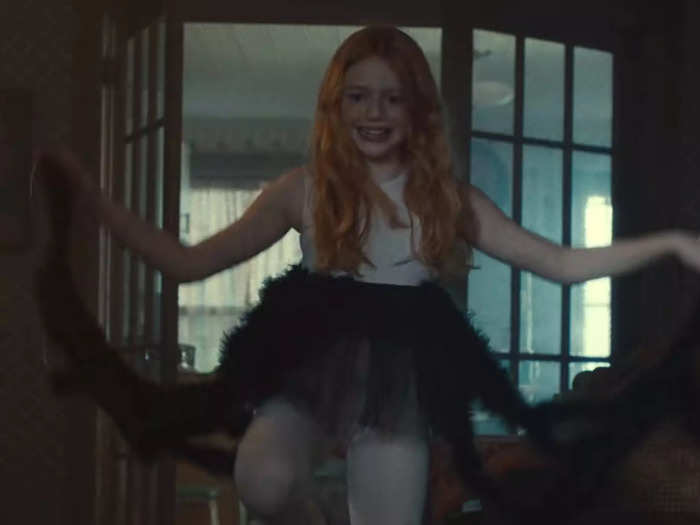
Towards the end of the episode, Nadia, who is in the body of the older version of Vera (Irén Bordán), watches her daughter Nora (Vaughan Marie Reilly) do a dance in a spider outfit. The young Nora says the dance is called "the dance of the tarantula." Nora might be referring to the Italian dance Tarantella, a dance that was originally formed to help people get rid of poison after a Tarantula bite.
Hence, this might relate to Nadia's own journey in season two where she tries to resolve her trauma and get rid of the "poison in her life." During the scene, we can also hear a baby crying in the background, foreshadowing Nadia ejecting herself out of her body when she gives birth in the following episode.
Delia says Maxine's iconic line "Sweet birthday baby" after Nadia is born.
One of the memorable lines from season one is when Maxine says "Sweet birthday baby" every time Nadia restarts the time loop. In episode six, Delia (Athina Papadimitriu) says the line as Nadia is being born in 1982.
This highlights the friendship relationships Nadia and her female relatives have.
While there are many differences between Nadia, her mother Nora, and her grandmother Vera, each has a close female friend, and that bond helps them carry on time and time again. Nadia has Maxine, Nora had Ruth, and Vera had Delia.
There are multiple circle references to show how time is still a closed loop in this season.
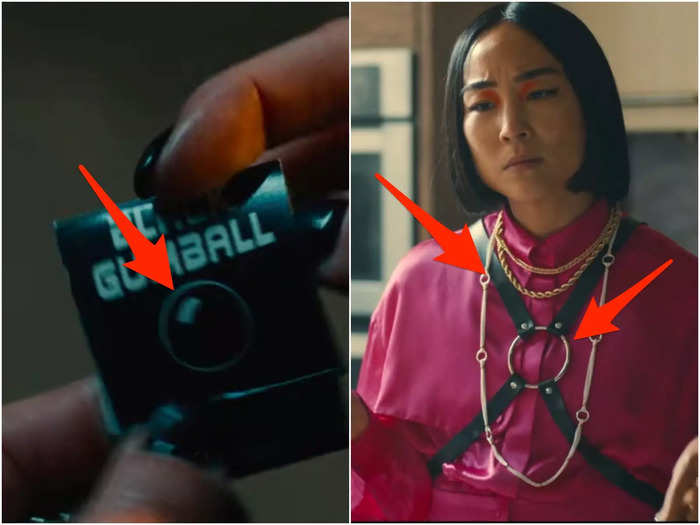
There is circle imagery everywhere throughout season two, from the logo on the Black Gumball matchbook Nadia (Natasha Lyonne) has in episode one to the clothing Maxine (Greta Lee) wears in episode two.
Culture reporter Max Cea wrote for Netflix's official news site Tudum that this easter egg relates to the phrase from the "True Detective" series that "time is a flat circle," following Friedrich Nietzsche's philosophy that existence recurs in an infinite cycle.
While it could be argued that this season has abandoned "Groundhog Day" time loops, there are multiple circular storylines within the season.
For example, in the first scene of season two, we see Nadia's grandmother Vera get a bag of her prized possessions out of the wall. This loop is closed when Nadia goes into the past in episode five and places the bag there. When Nadia realizes she's in a time loop in that same episode, the song "I Found Out Too Late" by The Sapphires starts playing in the background.
There are multiple references to death throughout season two.
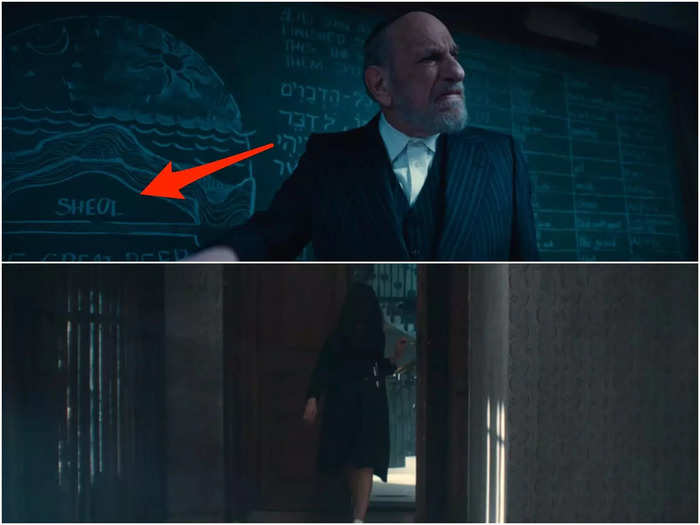
In season two, Nadia and Alan are forced to learn through their time-body-hopping journies how to truly live despite their past trauma and the constant threat of death.
"Personal Jesus" by Depeche Mode is a recurring anthem for Nadia, referring to her own death and resurrection through time loops. In the first episode of season two, while Nadia is crossing the street, a taxi just misses her — a clear callback to her first death in the show's premiere episode.
In season two episode five, when we see Nadia's grandmother's friend Delia (Franciska Farkas) in the past for the first time, she is wearing a black funeral veil. This could refer to the loss they have both felt due to the war, but also to Nadia still chasing death with her recklessness.
Finally, after Nadia breaks the flow of time in episode six, we see the Jewish school that used to be in Maxine's flat. The room has a grey tone making the rabbi and students appear almost like ghosts.
Coincidentally, the Rabbi at the front is instructing the class about the Sheol, a place where people's souls will go after death, according to the Hebrew Bible.
READ MORE ARTICLES ON
Popular Right Now
Popular Keywords
Advertisement